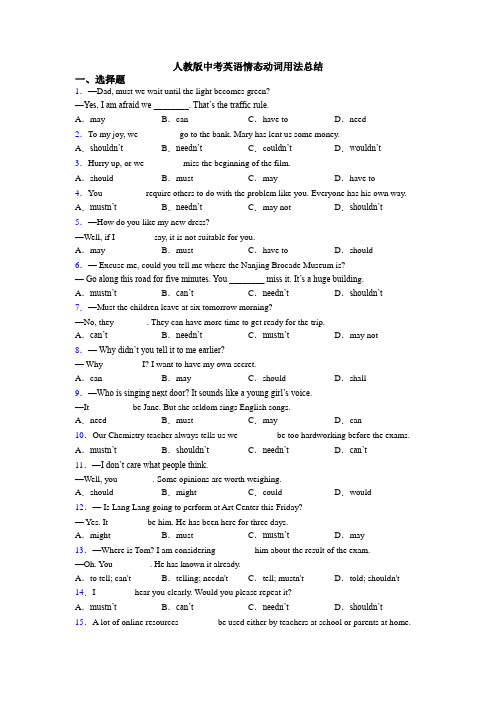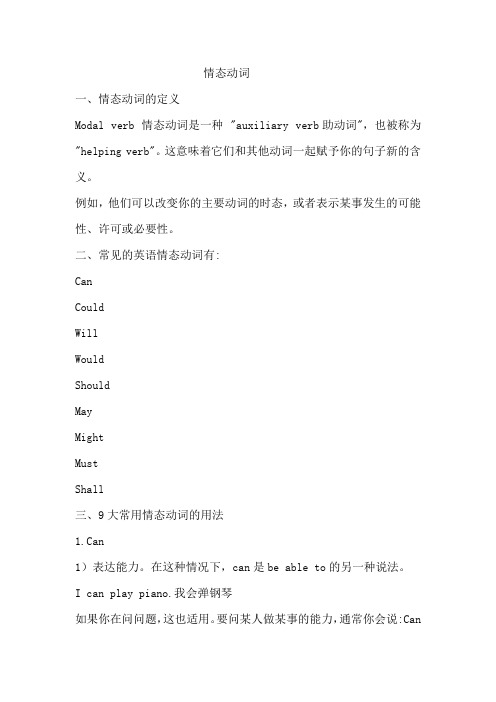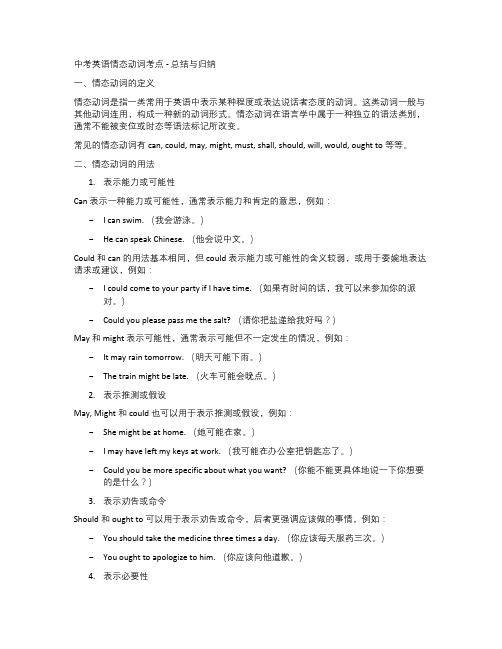人教版中考英语复习专题情态动词知识点总结
情态动词(20张PPT)初中英语专项复习课件

(1)只作情态动词:must;can/could;may/might;ought to
(2)既可作情态动词又可作实义动词:need,dare
((34))既 具可 有作 情情 态态 动动词词某又些可特作征稿稿定助:定hPa动PPvTP,e词T/海h:量asd素ha材tlo持l;/s续hha更odublde;twteirll/would
【知识拓展】
1. must的一般疑问句,肯定回答为Yes, ...must.;否定回答为No, ...needn’t./No, ...don’t have
to.—Must I clean the classroom now? 我必须现在打扫教室吗?
—Yes, you must. 是的,你必须。/No, you don’t have to. /No, you needn’t. 不,你不必。
He promised he would never smoke again. 他承诺他再也不吸烟了。
Their English teacher would tell them stories in
表示过去反复发生的动 English after class.
作或某种倾向
他们的英语老师总是在课后用英语给他们讲故事
新,上千款模板选择总有一
款适合你
知识点二:情态动词的特点
情态动词的特点: (1)情态动词无人称和数的变化(have to除外); (2)情态动词后接动词原形; (3)情态动词的否定式是在其后加not; have to除外 (4)具有助动词的作用,可用来构成否定句、疑问句及用于简明答语; (5)个别情态动词有现在式和稿过定去PP式T两种形式,过去式用来表达更加客气、委 婉的语气,时态性不强,可稿用定于PPT过,海去量、素材现持在续更或将来。
2020中考人教版初中英语情态动词知识点及经典练习题

中考人教版初中英语情态动词知识点及经典练习题情态动词知识点总结: (一) 情态动词的定义情态动词表示说话人对动作的态度,比如:需要,可能,意愿,猜测或者怀疑等等。
(二) 情态动词的特点1)有一定词义;2) 不受主语人称和数的变化影响;3) 与主要动词的原形(或称不带 to 的不定式)一起构成谓语(除 ought to 作固定词组看待) 4 )否定句中,在情态动词后面加 not 。
(三)情态动词有:must, shall, should, had better词形无变化can ( could ), may (might ), will (would ) 词形有变化n eed既可以是情态动词,也可以是实义动词,具有双重性。
(四) 情态动词的基本用法1. can (could )1)表示会做某事,有能力做某事。
意思=be able to其否定式can ' t 表示"不能”。
在过去时中用could 和couldn ' t. | (即有种能力,尤其是生来具备的能力,此时 may 和must 均不可代替它)。
He can speak En glish, but he can ' t speak Japa nese.=He is able to speak English, but he isn' t able to speak Japanese.I could smile but I could n ' t speak whe n I was 2 mon ths old.=I was able to smile but I wans ' t able to speak whe n I was 2 mon ths old. 区别:1、can 只用于现在时和过去时 (could ), be able to可用于各种时态。
They will be able to tell you the n ews soon.2、be able to 不与can 连用,但可以和其他情态动词或助动词连用。
中考动词知识点总结

中考动词知识点总结一、动词的分类1.情态动词情态动词是用来表示说话人的情感色彩或者表示说话人对某种行为的看法的动词。
常见的情态动词有can, could, may, might, must, shall, should, will, would等。
情态动词后面跟动词原形,表示主语的能力、许可、可能性、必要性、义务或意向等。
2. 动词的时态动词的时态是表示动作发生的时间的形式。
英语动词的时态有现在时、过去时和将来时,每种时态又可分为简单时、进行时和完成时。
掌握动词的时态对于正确理解英语句子的意思十分重要。
3. 及物动词和不及物动词及物动词是指后面需要接宾语的动词,而不及物动词则是指不需要接宾语的动词。
在中考中,考生需要对及物动词和不及物动词进行正确的使用和区分。
4. 动词的语态动词的语态分为主动语态和被动语态。
主动语态表示主语是动作的执行者,而被动语态则表示主语是动作的承受者。
中考中通常会考查考生对动词语态的正确理解和使用。
5. 不规则动词不规则动词是指在构成其过去分词和过去式时不遵循规则变化的动词。
在中考中,学生需要掌握常见的不规则动词的过去分词和过去式形式,以便正确使用这些动词。
二、动词的用法1. 动词的疑问句在英语的疑问句中,动词需要移至句首才能构成疑问句。
动词在疑问句中的变化和构成方式是中考中的重点考点之一。
2. 动词的否定句在英语的否定句中,需要在动词前加上助动词not来构成否定句。
在中考中,学生需要掌握动词否定句的构成方式,并在实际应用中正确使用。
3. 动词的不定式不定式是动词的一种特殊形式,它可以有自己的主语和宾语,并且可以放在句子的任何位置。
中考会考查学生对不定式的正确使用和理解。
4. 动词的动名词动名词是由动词加上-ing构成的名词形式,它可以充当名词使用。
在中考中,学生需要掌握动名词的构成方式和用法,以便正确使用动名词。
5. 动词的情态动词和助动词情态动词和助动词在句子中的作用是不同的,学生需要掌握情态动词和助动词的用法和区别。
最新版-英语情态动词专项复习

we can see his name on it .
7
4. need (需要) 既可做实义动词也可做情态动词 1)实义动词 need to do sth 需要做某事
Eg: I need to buy a big house . --- Do you need to buy a big house ? --- Yes , I do . No, I don’t . He needs to borrow a map . --- Does he need to borrow a map ?
Yes ,you may. No, you mustn’t. No, you can’t.
Yes, you must. No, you needn’t. No you don’t have to
Yes, you must. No, you needn’t
1.Must I take the keyboard to the office now ?
2) 情态动词 need do sth 需要做某事 Eg: I need buy a big house .
8
5. have to
不得不
Eg: It’s eleven o’clock . I have to go now .
He has to finish the work first .
请注意: I don’t have to go now .
--No, you __C___.Tomorrow is Saturday .You
may get up later.
A mustn’t
人教版中考英语情态动词用法总结

人教版中考英语情态动词用法总结一、选择题1.—Dad, must we wait until the light becomes green?—Yes, I am afraid we ________. That’s the traffic rule.A.may B.can C.have to D.need2.To my joy, we_________ go to the bank. Mary has lent us some money.A.shouldn’t B.needn’t C.co uldn’t D.wouldn’t 3.Hurry up, or we ________ miss the beginning of the film.A.should B.must C.may D.have to4.You ________ require others to do with the problem like you. Everyone has his own way. A.mustn’t B.needn’t C.may not D.shouldn’t 5.—How do you like my new dress?—Well, if I ________ say, it is not suitable for you.A.may B.must C.have to D.should6.— Excuse me, could you tell me where the Nanjing Brocade Museum is?—Go along this road for five minutes. You ________ miss it. It’s a huge buildin g. A.mustn’t B.can’t C.needn’t D.shouldn’t 7.—Must the children leave at six tomorrow morning?—No, they _______. They can have more time to get ready for the trip.A.can’t B.needn’t C.mustn’t D.may not 8.—Why didn’t you tell it to me earlier?— Why ________ I? I want to have my own secret.A.can B.may C.should D.shall 9.—Who is singing next door? It sounds like a young girl’s voice.—It _________ be Jane. But she seldom sings English songs.A.need B.must C.may D.can10.Our Chemistry teacher always tells us we ________ be too hardworking before the exams. A.mustn’t B.shouldn’t C.needn’t D.can’t11.—I don’t care what people think.—Well, you _______ . Some opinions are worth weighing.A.should B.might C.could D.would 12.— Is Lang Lang going to perform at Art Center this Friday?— Yes. It ________ be him. He has been here for three days.A.might B.must C.mustn’t D.may 13.—Where is Tom? I am considering ________ him about the result of the exam.—Oh. You ________. He has known it already.A.to tell; can't B.telling; needn't C.tell; mustn't D.told; shouldn't 14.I ________ hear you clearly. Would you please repeat it?A.mustn’t B.can’t C.needn’t D.shouldn’t 15.A lot of online resources ________ be used either by teachers at school or parents at home.A.can B.should C.need D.must16.You ______ pay too much attention to your pronunciation, as it is so important in the oral (口头的) test.A.shouldn’t B.mustn’t C.can’t D.needn’t17.My bike was broken yesterday,so I____walk home.A.might B.had to C.must D.could18.— Ready? Let’s get started, Martin.— Swimming? I just ________ get used to it in winter.A.can’t B.needn’t C.mustn’t D.shouldn’t 19.Think twice before making a decision, or you __________ get into trouble.A.may B.can't C.shouldn't D.mustn't20.—Be careful! Fire ________ be dangerous sometimes.—OK. I will put it out right away.A.mustn’t B.should C.can D.needn’t21.Look at the floor, Tom! ________ you watch TV while having a meal?A.Should B.Could C.Must D.May22.We've discussed every detail of this plan and have got everything ready. But still something ________ go wrong. We still have to be very careful.A.must B.should C.would D.may23.—Is that Mr Zhou?—It ________ be him. He has gone to Beijing.A.can B.may C.can’t D.shouldn’t 24.— Mum, why do I have to wash hands so many times a day?—You ________ be too careful, for your health.A.can’t B.mustn’t C.may not D.needn’t 25.—Will Jim come to Yangzhou for a holiday?—He ________come and it depends on how much homework he will have.A.may B.should C.must D.need26.— Is the boy over there Tom? He often wears a jacket like that.— It _______ be him. He is absent from school today.A.needn’t B.shouldn’t C.mustn’t D.can’t27.When people are waiting at the zebra crossing, cars and buses ________ wait and let them go first.A.must B.may C.can D.need28.—Shall I tell him the change of the time right now?—I’m afraid you ________, otherwise he will be late for the meeting.A.can B.may C.must D.need29.To avoid ________, we’d better ________ the parents’ meeting online.A.gather; hold B.gathering; hold C.gather; holding D.to gather; to hold30.—Must we stop the Japanese government discharging nuclear waste water (排放核污水) into the Pacific Ocean?—________. Because everyone should protect our earth and it is bad ________ us to eat the polluted seafood and drink the waste water.A.Yes, we can; of B.No, we mustn’t; of C.Yes, we must; for D.No, we needn’t; for 31.According to the rule, used batteries ________ be dropped in the red bin for harmful wastes. A.may B.would C.should D.might 32.—Excuse me. I haven’t finished reading the book yet. May I keep it a bit longer?— Sorry, you ________. You must return it on time.A.needn’t B.can’t C.won’t D.shouldn’t 33.Cars ________ give way to walkers on some roads in Binhai, or the drivers will be fined. A.may B.will C.can D.must 34.Sometimes smiles ________ be false, hiding other feelings like anger, fear or worry. A.should B.would C.must D.can35.You’ve got an A in the maths test again. You ________ be good at it.A.can B.may C.must D.should 36.—Could you tell me how to renew the library books?—With pleasure. You ________ come to our desk every time. It’s easier to renew them online. A.can’t B.mustn’t C.needn’t D.shouldn’t 37.—How beautiful the winter jasmines (迎春花) are!—Yes. These golden-yellow flowers ________ be widely seen in my city in March.A.must B.can C.would D.should 38.—Mum, I bought some strawberries on my way home.—Oh, you’re so sweet. But the strawberries ________ be put into the fridge for freshness. A.must B.can C.may D.need39.—________ I see your ID card? We have to check your personal information.—Sure. Here you are.A.May B.Need C.Should D.Must40.—Will dad arrive home at 6 o’clock to have dinner with us this evening?— I think he will, but he ________ not. Sometimes he works extra hours.A.can B.must C.need D.may【参考答案】一、选择题1.C解析:C【详解】句意:——爸爸,我们一定要等绿灯吗?——是的,恐怕我们必须这样做。
人教版中考英语语法复习情态动词总结

情态动词一、情态动词的定义Modal verb 情态动词是一种 "auxiliary verb助动词",也被称为"helping verb"。
这意味着它们和其他动词一起赋予你的句子新的含义。
例如,他们可以改变你的主要动词的时态,或者表示某事发生的可能性、许可或必要性。
二、常见的英语情态动词有:CanCouldWillWouldShouldMayMightMustShall三、9大常用情态动词的用法1.Can1)表达能力。
在这种情况下,can是be able to的另一种说法。
I can play piano.我会弹钢琴如果你在问问题,这也适用。
要问某人做某事的能力,通常你会说:Canyou…?Can you speak English?你会说英语吗2)有时也被用作提供帮助或请求许可的一种方式。
I can watch your dog while you're on vacation.你度假时我可以照看你的狗。
Can you please pass the butter?请把黄油递给我好吗?3)表达某事发生的可能性。
Houses can flood in this region during rainstorms.暴风雨期间,这个地区的房屋会被淹。
2.Could1)Could表示can的过去式。
用它来表达能力,但是是用在谈论过去的时候。
I could understand German when I was a kid.我小时候能听懂德语。
Could you hear the birds chirping yesterday morning?昨天早上你能听到鸟叫吗?2)Could有时用来表示可能性,与can相似。
但是,与can不同,它用于更少的具体可能性和建议。
We could go to the park or we could go to the mall.我们可以去公园,也可以去购物中心。
人教新目标中考英语常用语法知识——情态动词知识点总结(含答案解析)

一、选择题1.Please let me ________you if you meet trouble.A.help B.to help C.helps D.helping A解析:A【解析】【详解】句意:如果你遇到困难请让我帮助你。
考查固定搭配。
help动词原形;to help动词不定式;helps动词三单;helping动名词。
分析句子可知,此处用于let sb. do sth.结构中,所以用动词原形,故选A。
2.Don’t ________ your glass too _______.A.fill; full B.fill; filled C.full; full D.full; filled A解析:A【解析】【分析】【详解】句意:不要把你的杯子倒得太满。
考查动词和形容词辨析。
fill填充,动词;full满的,形容词。
本句是否定祈使句,前空需用动词,full是形容词,可排除CD两项。
后句too (太)是形容词,修饰形容词或副词。
根据句意语境,可知选A。
3.Don’t________ in the classroom. It’s important ________ quiet when you study. A.talk, keep B.to talk, keep C.talk, to keep D.to talk, to keep C 解析:C【解析】【详解】句意:不要在教室里交谈。
当你学习的时候保持安静是重要的。
talk交谈,原形;to talk交谈,动词不定式;keep保持;原形;to keep保持,动词不定式。
第一空是否定祈使句,其结构是Don’t+动词原形。
排除BD;It’s important+to do sth.表示做某事是重要的。
排除A。
根据题意,故选C。
【点睛】祈使句的否定结构是以“Don”t+动词原形”开头.例如:Don”t go there,please.请别去那儿.Don”t be late.不要迟到.4.Mike, __________ make any noise, your father is sleeping.A.not B.don't C.won't D.can't B解析:B【解析】【详解】句意:麦克,不要吵闹,你父亲正在睡觉。
中考英语情态动词考点总结与归纳

中考英语情态动词考点 - 总结与归纳一、情态动词的定义情态动词是指一类常用于英语中表示某种程度或表达说话者态度的动词。
这类动词一般与其他动词连用,构成一种新的动词形式。
情态动词在语言学中属于一种独立的语法类别,通常不能被变位或时态等语法标记所改变。
常见的情态动词有 can, could, may, might, must, shall, should, will, would, ought to 等等。
二、情态动词的用法1.表示能力或可能性Can 表示一种能力或可能性,通常表示能力和肯定的意思,例如:-I can swim. (我会游泳。
)-He can speak Chinese. (他会说中文。
)Could 和 can 的用法基本相同,但 could 表示能力或可能性的含义较弱,或用于委婉地表达请求或建议,例如:-I could come to your party if I have time. (如果有时间的话,我可以来参加你的派对。
)-Could you please pass me the salt? (请你把盐递给我好吗?)May 和 might 表示可能性,通常表示可能但不一定发生的情况,例如:-It may rain tomorrow. (明天可能下雨。
)-The train might be late. (火车可能会晚点。
)2.表示推测或假设May, Might 和 could 也可以用于表示推测或假设,例如:-She might be at home. (她可能在家。
)-I may have left my keys at work. (我可能在办公室把钥匙忘了。
)-Could you be more specific about what you want? (你能不能更具体地说一下你想要的是什么?)3.表示劝告或命令Should 和 ought to 可以用于表示劝告或命令,后者更强调应该做的事情,例如:-You should take the medicine three times a day. (你应该每天服药三次。
- 1、下载文档前请自行甄别文档内容的完整性,平台不提供额外的编辑、内容补充、找答案等附加服务。
- 2、"仅部分预览"的文档,不可在线预览部分如存在完整性等问题,可反馈申请退款(可完整预览的文档不适用该条件!)。
- 3、如文档侵犯您的权益,请联系客服反馈,我们会尽快为您处理(人工客服工作时间:9:00-18:30)。
人教版中考英语复习专题情态动词知识点总结一、初中英语情态动词1.— I take the magazine out of the reading room?— I'm sorry you .A. Could; couldn'tB. Must; couldn'tC. Will; can'tD. May; can't【答案】 D【解析】【分析】句意:——我可以把杂志带出阅览室吗?——对不起,你不能。
could 能,可以;must必须;will将;may可以;can能,可以,can't不可以,不能。
此处表示请求许可,用could或者may,由could或者may构成的一般疑问句,肯定回答用yes,主语+can,否定回答用sorry,主语+can't,结合选项,故答案选D。
【点评】考查情态动词的辨析。
注意理解句意,理解选项,根据语境,选出正确的答案。
2.You _____ walk too close to the edge of the path because you might fall and hurt yourself.A. mayB. mightC. needn'tD. musn't【答案】 D【解析】【分析】句意:你不能走得太靠近路的边缘,因为你可能跌倒伤害自己。
A. may 可以,表允许;B. might可能,表推测;C. needn't不必,指没有必要;D. musn't不能,表示不允许或禁止。
根据句意语境,本句是不允许离路边太近,故选D。
【点评】考查情态动词辨析题。
注意分析句意和词义。
3.—Where is George?—He _______ be here just now. His coffee is still warm.A. needB. can'tC. mustD. shouldn't【答案】 C【解析】【分析】句意:——乔治在哪里?——他刚才一定在这里,他的咖啡还是热的。
A. need需要; B. can't 不能,不可能(表示推测); C. must 必须,一定(表示推测); D. shouldn't不应该;根据His coffee is still warm.可知表示肯定推测一定在这儿;故答案为C。
【点评】考查情态动词。
掌握情态动词表推测时的意义和用法。
4.Teenagers allowed to drive .A. should not beB. should be notC. not should be【答案】A【解析】【分析】句意:年轻人不应该被允许驾车。
Should是情态动词,其否定表达一般在在后面加副词not,故选A。
【点评】此题考查含有情态动词的被动语态的否定形式。
平时注意记忆情态动词的记忆和用法。
5.You be tired after walking for such a long time. Sit down and have a rest.A. canB. can'tC. mustn'tD. must【答案】 D【解析】【分析】句意:走了这么长时间你一定很累了。
坐下休息一下吧。
can能,能够,can't不能,对事物进行否定推测;mustn't一定不是,禁止,must一定,对事物进行肯定推测,根据after walking for such a long time,可以肯定你一定很累,所以是进行肯定推测,情态动词使用must,故选D。
【点评】此题考查情态动词。
弄清每个情态动词的使用规则,根据句意确定所使用的情态动词。
6.Harry's been driving all day—— he be tired.A. needB. canC. shallD. must【答案】 D【解析】【分析】句意:哈利已经开了一整天车了——他一定累了。
根据句意可知,开了一整天车,所以推测他累是一定的。
所以用情态动词must。
故选D。
7.Rock music ______ sound popular with the young, but it's not the favor of the aged people.A. mustB. needC. shouldD. may【答案】 D【解析】【分析】句意:摇滚音乐在年轻人中听起来受欢迎,但是它不受上了年龄的人的赞同。
must, 表示猜测时,指把握比较大的肯定猜测,肯定……;need需要;should,应该;may,表示把握比较小的肯定猜测,可能,也许。
结合句意,故选D。
【点评】考查情态动词辨析,注意几个常见情态动词的意思和用法。
8.All passengers ______ go through safety check before they take a plane.A. canB. mayC. mustD. could【答案】 C【解析】【分析】句意:所有乘客登机前必须接受安全检查。
A. can能够,表示能力;B. may可以,表示许可;C. must必须;D. could可能,可以。
登机前必须安检。
故选C。
【点评】情态动词词义辨析。
以及can、may、must、could四个词的词义和用法。
9.—Mum, I play football this afternoon?—Sure, but you finish your homework first.A. may; couldB. can; mustC. can; mustn'tD. may; can't【答案】 B【解析】【分析】句意:-妈妈,今天下午我能踢足球吗?-当然,但是你必须先完成作业。
前句提请求,can,may都可以;后句,由sure可知后句用肯定回答。
Could表示一种委婉的语气;must表示主观愿望:必须。
妈妈要求孩子“必须”先完成作业。
故选B。
【点评】考查情态动词辨析,may表示请求时候的回答用语。
10.— Shall I book some seats for the concert?—______. I've done that.A. Yes, you mayB. No, you mustn'tC. No, you needn'tD. No, you can't【答案】C【解析】【分析】Yes, you may是的,你可以;No, you mustn't 不,你千万不要;No, you needn't不,你不必;No, you can't不,你不能。
句意:我要预定一些音乐会的座位吗?根据下文,我已经办了。
可知选C最符合语境。
【点评】考查交际用语11.— _______ you play tennis?—Yes, and I'm a good player.A. CanB. MayC. MustD. Should【答案】 A【解析】【分析】句意:——你会打网球吗?——会,我是一名优秀的网球员。
Can能,表示能力;may可以,表示允许;must必须,表示要求;should应该,表示建议;结合句意,此处表示能力,故用情态动词can,故选A。
【点评】此题考查情态动词的用法。
12.You __________ write the poem down. Our teacher will give us a copy soon.A. needn'tB. mustn'tC. shouldn'tD. can't【答案】A【解析】【分析】句意:你不需要把诗抄下来,老师很快会给我们一份。
A.不必;B.不准,禁止,不允许;C.不应该,表示责任、义务;D.不能,表示能力,不可能,表示否定的推测。
老师要给我们一份,所以不必抄写。
故选A。
13.You are supposed to bow when you meet someone from Korea.A. mustB. shouldC. wouldD. can【答案】 B【解析】【分析】句意:当你遇到来自韩国的人时,你应该鞠躬。
A. must必须,强调主观上的愿望;B. should应该,表示责任与义务;C. would要,将要;D. can能,会,表示能力。
Be supposed to 表示“应该”,故选B。
【点评】本题考查情态动词词义辨析,以及must、should、would、can四个情态动词的词义和用法。
14.Size and type do not matter — you ______ do almost anything if you never give up. A. should B. must C. need D. can【答案】 D【解析】【分析】句意:大小和类型不重要——如果你不放弃,你几乎可以做任何事。
A. should应该;B. must 必须; C. need 需要;D. can可以,能;根据 if you never give up,可知此处说你能做几乎任何事情,故选D。
【点评】此题考查情态动词辨析。
根据上下文的联系确定所使用的情态动词。
15.—Some people don't show their talents at the very beginning.—I agree. Even Einstein ____________ read until he was seven.A. can'tB. mustn'tC. couldn'tD. needn't【答案】 C【解析】【分析】句意:——一些人在一开始的时候没有表现处自己的才能。
——我同意。
甚至爱迪生直到七岁时才会读书。
can't不能;mustn't一定不会,禁止;couldn't不能;needn't。
not...until...,直到……才……,根据 Some people don't show their talents at the very beginning. 可知此处指爱迪生7岁才会读书,指才能,能做某事,根据he was seven ,可知句子时态是过去时,故选C。
【点评】此题考查情态动词辨析。
根据上下文的联系确定句中所使用的情态动词。
16.As middle school students, we follow the public rules wherever we go.A. wouldB. shouldC. mightD. could【答案】 B【解析】【分析】句意:作为中学生,无论走到哪里我们应该遵守公共规章制度。
